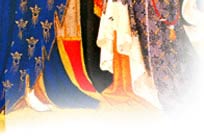 |
|||
 

|
Holidays and Celebrations Medieval celebrations revolved around feast days that had pagan origins and were based on ancient agricultural celebrations that marked when certain crops should be planted or harvested. Wheat and rye were sown from Michaelmas (September
29) to Christmas. Spring crops would be planted from the end of Christmas
through Easter. Christmas, Easter, Pentecost (or Whitsunday) would be
celebrated with a feast of the Church, and would be followed by a week
of vacation. Lesser celebrations such as: By November, feed was often too scarce to keep animals through the winter, and became known as the "blood month" when meat was smoked, salted and cured for consumption during the long winter ahead. The month began with All Hallows (later, All Saints) Day, followed by St. Martin's Day (November 11). Medieval society celebrated the grandest feast during the dreariest time of year. The two-week period from Christmas Eve to Twelfth Day (January 6) transformed into the longest vacation for workers. The Lord of the manor or castle often gave bonuses of food, clothing, drink and firewood to servants. Houses were decked with holly and ivy, and giant Yule logs were brought in and burned throughout the two-week celebration. New Year's took place during this time and added to the festivities, and "First Gifts" were often exchanged on this day. "Plow Monday" took place the day after Epiphany, and freemen of the village would participate in a plow race, to begin cultivation of the town's common plot of land. Each man would try and furrow as many lines as possible, as he would be able to sow those lines during the coming year. Children would play the role of "Fool Plow" and go from house to house asking for pennies. Those who refuse would find the ground in front of their door plowed up. Easter, as Christmas, was a day for exchanging gifts. The castle lord would receive eggs from the villagers and in return, provide servants with dinner. May saw celebrations of love, especially on the 1st. Villagers would venture into the woods to cut wildflowers and other greenery for their homes to usher in May and hope for a fertile season. |
 |
|
 |
|||
 |
|||